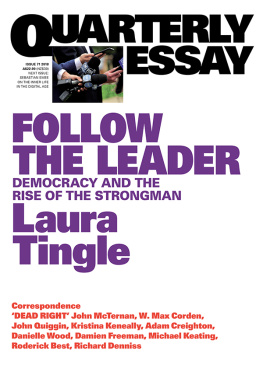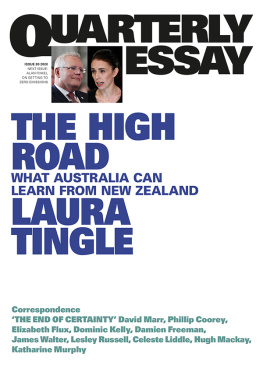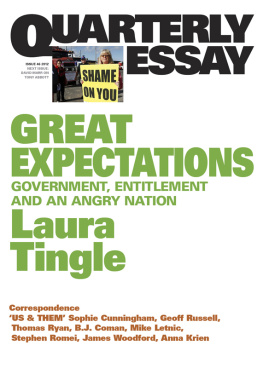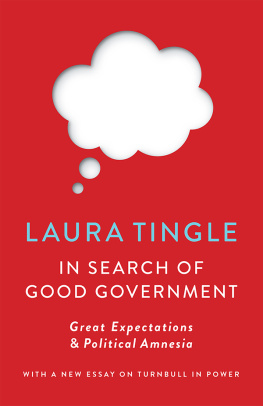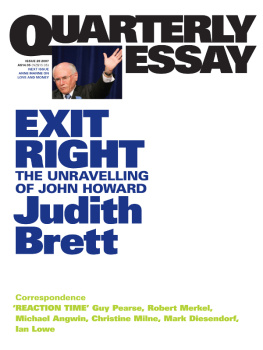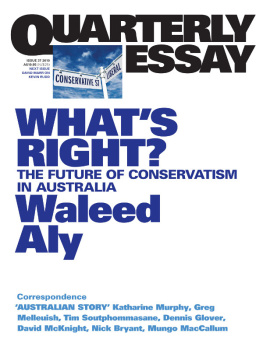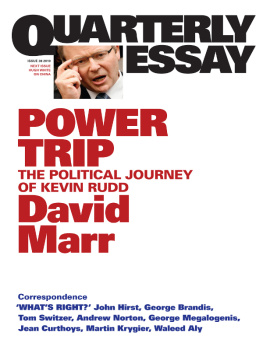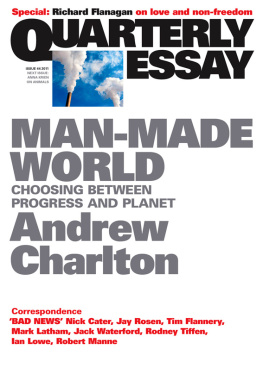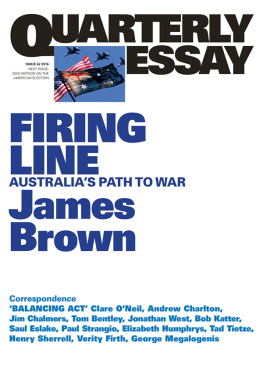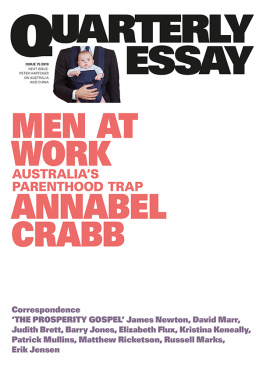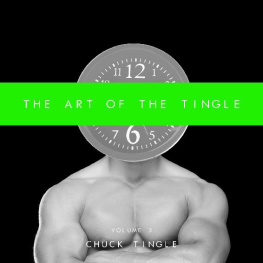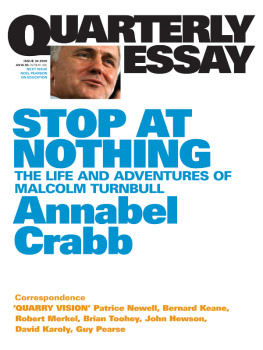Quarterly Essay is published four times a year by Black Inc., an imprint of Schwartz Publishing Pty Ltd. Publisher: Morry Schwartz.
ISBN 9781743820599 ISSN 1832-0953
ALL RIGHTS RESERVED.
No part of this publication may be reproduced, stored in a retrieval system, or transmitted in any form by any means electronic, mechanical, photocopying, recording or otherwise without the prior consent of the publishers.
Essay & correspondence retained by the authors.
Subscriptions 1 year print & digital (4 issues): $79.95 within Australia incl. GST. Outside Australia $119.95. 2 years print & digital (8 issues): $149.95 within Australia incl. GST. 1 year digital only: $49.95.
Payment may be made by Mastercard or Visa, or by cheque made out to Schwartz Publishing. Payment includes postage and handling.
To subscribe, fill out and post the subscription card or form inside this issue, or subscribe online:
quarterlyessay.com
Phone: 61 3 9486 0288
Correspondence should be addressed to:
The Editor, Quarterly Essay
Level 1, 221 Drummond Street
Carlton VIC 3053 Australia
Phone: 61 3 9486 0288 / Fax: 61 3 9011 6106
Email:
Editor: Chris Feik. Management: Caitlin Yates.
Publicity: Anna Lensky. Design: Guy Mirabella.
Assistant Editor: Kirstie Innes-Will. Production
Coordinator: Hanako Smith. Typesetting: Akiko Chan.
FOLLOW THE LEADER | Democracy and the Rise of the Strongman |
Laura Tingle |
London, June 2017. A leadership crisis is upon us. Having cheerfully followed my lead as we clambered over the remnants of ancient Roman civilisation at the beginning of my first Quarterly Essay, Great Expectations, and contemplated Tacitus and the fall of the Roman Empire at the beginning of my second, Political Amnesia, Tosca Ramsey, my daughter, my diva filia, has had enough as we travel on perhaps our last Excellent Girls Adventure abroad together. Now almost nineteen, Tosca has perfected the teenage eye-roll and barely disguised contempt. Oh. My. God, Tosca says, as I prod helplessly at a ticket machine in the vast concourse of Waterloo Station. I cant believe you just did that. She strides off to sort out our ticket purchases, gloriously unaware of the young men walking into poles and garbage bins as she passes by. Although oblivious to the path of male destruction she leaves in her wake, she is more than aware of the effect she is having on her mother: the assertion of independence; of greater knowledge of the world and what is needed to operate in it; of greater competence and capacity to lead us on the next stage of our journey. Happy to follow along on our past adventures, in this one my girl has nicked the field marshals baton from my knapsack and made a charge for the front.
Leadership, it turns out, is a two-way thing. Leaders kid themselves that they are setting the terms of play, even running the world. And we write and think about them in those terms. But in fact true leaders only get to lead if they have followers whom they can persuade to follow. So often it is what followers want that determines whether leaders get to emerge at all. And as we have seen in Australia in recent years, it is followers in the party and what they think followers outside the party want that determines whether they stay there.
I didnt yet realise, when I was being bathed in scorn at Waterloo Station, that there was an obvious final instalment, a trilogy to complete, in the consideration of Australian expectations of government, and our failing institutional memory, that I began in 2012. That final instalment concerns political leadership in the modern world. For whatever our expectations of government, whatever the state of our institutions and institutional memory, it is leadership that helps both to settle those things, and change them.
We dont much discuss our expectations of government, or consider the changing nature of the institutions that hold our society together, and so often we have faulty memories of what has gone before. But we do increasingly focus our frustration with our society and our politics on the human form of our leaders. We bemoan a lack of leadership. Some yearn for the good old days when we had it. Yet when we get it, we sometimes dont recognise it, and even if we do, we seldom reward it.
People always grumble about political leaders. But there is a deeper malaise afoot now. Zoom out from the daily inanity of the domestic news cycle. Zoom out even further from the point where you shake your head in disbelief at Trumpian political developments around the world or local Liberal Party madness. Consider something a little unlikely as a sign of our leadership discontents.
Young peoples fiction these days comes in ever faster waves of franchises seeking to ride particular crazes: for wizards, zombies, vampires or the post-apocalyptic. In many of these books, TV series and films, the same themes recur: societies in which the rules have broken down, in which there are no people in positions of authority, or even formal leadership structures. These are stories built on disillusionment and a suspicion of social structure which often acts as a threat to our heroes, who invariably are just average kids. Rugged individuals must make do, striving to stay alive, at least until the end of the book or episode.
Our young people absorb, but are also attracted to, these worlds with their broken-down societies or absent leaders. This might be no more than a reflection of the slightly maudlin phase many of us go through as teenagers. At first glance, an obsession with the post-apocalyptic would seem more understandable in those of us who grew up during the Cold War, rather than the second decade of the twenty-first century. But the disillusionment reflected in fictional domains coincides with the global return of the strongman to politics. And with these two conflicting trends comes a belated alarm that the world is not naturally tending to the Western democratic model that many of us smugly assumed had triumphed and become irresistible at the end of the Cold War.
*
In so many ways, the qualities and requirements of leadership are eternal. We have all read about the great figures of history, and that reading has shaped our views of what makes a true leader. But if Im right about the changing expectations we have of politics and if our institutions and institutional memory are being transformed then there is much to say about how those human beings who have a will to influence others, and to power, rub up against the forces at play in modern politics.
This essay considers those forces, and how leaders and leadership are responding to them. It is just too easy to say our current leaders arent up to scratch (even if they arent). We need to have a more sophisticated discussion about what they might lack and how we judge what they need to give us. But instead, when our young people look back at the real world, they see a deep cynicism about political leaders but also an unhealthy obsession; and a focus not so much on what they might have achieved for their communities, but merely on their personal traits.
In Australia, for example, the recent debate about Adanis controversial proposed coalmine in central Queensland descended at one point into a discussion of Bill Shortens personality and honesty, rather than the merits or risks of the massive project. It became a discussion of the different messages Shorten sent to different audiences and what this told us about his character.


